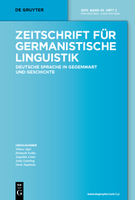
ZEITSCHRIFT FUR GERMANISTISCHE LINGUISTIK
Scope & Guideline
Connecting Theory and Practice in Linguistics
Introduction
Aims and Scopes
- Diachronic Linguistics:
The journal frequently publishes studies examining the historical development of the German language, including morphological changes and the evolution of linguistic structures. - Pragmatics and Discourse Analysis:
There is a consistent focus on the pragmatic aspects of language use, particularly in digital communication and public discourse, exploring how language functions in various contexts. - Language Education and Acquisition:
Research on language teaching methodologies, learner corpora, and the dynamics of second language acquisition is a significant area of interest, reflecting the journal's commitment to educational linguistics. - Digital Communication:
The impact of digital technologies on communication practices is a core theme, with studies analyzing social media discourse, online public spheres, and the linguistic implications of digital interactions. - Gender Linguistics:
The journal addresses contemporary issues in gender linguistics, including the analysis of gender-inclusive language and the societal implications of linguistic choices. - Methodological Innovations:
The journal emphasizes the use of innovative research methodologies, including computational and corpus linguistics, to advance the study of German linguistics.
Trending and Emerging
- Digital Publics and Communication:
There is a growing body of work examining how digital platforms shape linguistic practices and public discourse, indicating an increasing interest in the interplay between language and technology. - Health Communication:
Research focusing on health communication, particularly in educational contexts, has emerged as a significant theme, highlighting the role of language in public health discourse. - Intersection of Language and Gender:
The exploration of gender issues in language, including the usage of gender-inclusive forms and the societal implications of linguistic choices, has gained traction in recent publications. - Corpus Linguistics and Data-Driven Research:
The use of corpus linguistics as a methodology for analyzing language data is on the rise, with scholars employing quantitative methods to explore various linguistic phenomena. - Interdisciplinary Approaches to Linguistics:
An increasing trend towards interdisciplinary research is evident, with studies integrating insights from fields such as communication studies, sociology, and digital humanities. - Language and Identity:
Emerging research is focusing on the relationship between language and identity, particularly in the context of globalization and multiculturalism.
Declining or Waning
- Traditional Syntax Studies:
Research focusing solely on traditional syntactic structures without interdisciplinary approaches has become less frequent, as the field increasingly integrates insights from pragmatics and discourse analysis. - Historical Linguistics in Isolation:
While diachronic studies are still relevant, papers that focus exclusively on historical linguistics without connections to contemporary issues or methodologies have decreased. - Regional Dialect Studies:
Although dialectology remains important, there seems to be a waning interest in regional dialect studies that do not engage with broader sociolinguistic or digital contexts. - Static Grammar Descriptions:
There is a noticeable decline in articles that present static descriptions of grammatical rules, as the journal shifts towards dynamic analyses that consider language in use. - Linguistic Theory without Application:
Papers that discuss linguistic theories without practical application or relevance to current linguistic issues are becoming less common, reflecting a trend towards applied linguistics.
Similar Journals

Language and Linguistics Compass
Charting New Territories in Language and LinguisticsLanguage and Linguistics Compass, published by Wiley, stands as a premier journal in the field of linguistics, showcasing innovative and interdisciplinary research. With its ISSN 1749-818X and E-ISSN matching, the journal has built a robust reputation, achieving an impressive Q1 ranking within the linguistics category for 2023, placing it in the top 4% of its field. Its Scopus rank of 48 out of 1167 highlights its influence and significance among linguistics journals, boasting a commendable 95th percentile. This journal serves as a vital resource for researchers, professionals, and students, offering a wide range of accessible articles that illuminate current trends and advances within the domain of language studies. Although it is not Open Access, the journal is committed to quality and diversity in its publications, ensuring scholarly articles from various sub-disciplines of linguistics are represented from 2008 through 2024. Located in the United Kingdom, Language and Linguistics Compass invites contributions from around the globe, reinforcing its status as a leading forum for linguistic discourse.
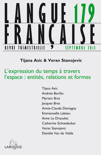
LANGUE FRANCAISE
Fostering Innovation in Language ResearchLANGUE FRANCAISE, published by LAROUSSE, stands as a premier journal in the realm of linguistics and language studies, boasting an impressive Q1 quartile rating in the 2023 Linguistics and Language category. With its international reputation anchored in France, this journal presents critical research and discussions that advance our understanding of the French language, its structures, usage, and evolution. Although not an open-access publication, LANGUE FRANCAISE is indexed with an ISSN of 0023-8368 and an E-ISSN of 1957-7982, reflecting its scholarly credibility and impact, including Scopus rankings that place it competitively in the fields of arts and humanities as well as social sciences. This journal serves as an essential resource for researchers, practitioners, and students aiming to deepen their knowledge and engage in scholarly debates that shape contemporary linguistic thought. The journal's commitment to high-quality research continues to foster an enriching academic environment and contribute to the dynamic discourse surrounding language and linguistics.
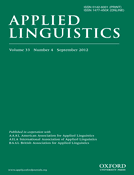
APPLIED LINGUISTICS
Bridging Theory and Practice in Language StudiesApplied Linguistics, published by Oxford University Press, is a premier scholarly journal that has significantly contributed to the fields of linguistics and communication since its inception in 1980. With an impressive impact factor and ranked in the top quartile (Q1) in both Communication and Linguistics and Language categories, Applied Linguistics is recognized for its rigorous peer-reviewed articles that explore the intersections of language, society, and cognition. The journal enjoys a remarkable position in the Scopus rankings, placing it among the top 2% of publications in its discipline. Researchers, professionals, and students benefit from its comprehensive scope, which encompasses innovative research on language acquisition, discourse analysis, and applied linguistics methodologies. Although not an open access journal, its commitment to advancing knowledge and fostering academic discussions makes it an indispensable resource for anyone interested in the critical role of language in various contexts.

Russian Journal of Linguistics
Advancing the Frontiers of Linguistic ResearchWelcome to the Russian Journal of Linguistics, a prestigious journal published by Peoples Friendship University of Russia that has made significant strides in the realm of linguistic studies since its inception. With an Open Access policy established in 2019, this journal provides unparalleled opportunities for researchers, professionals, and students to share and disseminate groundbreaking linguistic research. The journal is currently ranked in the Q1 category for Linguistics and Language and boasts impressive Scopus rankings, placing 129th out of 1088 in the Arts and Humanities, and 148th out of 1167 in the Social Sciences. Focusing on a diverse range of linguistics topics, the journal aims to facilitate cross-disciplinary dialogue and foster advancements in the study of language. Located in Moscow, Russia, it champions the vibrant linguistic community by consistently publishing high-quality research that contributes to the global understanding of language dynamics. We invite you to explore the wealth of knowledge and insight the Russian Journal of Linguistics has to offer.

Revista Virtual de Estudos da Linguagem-ReVEL
Advancing Knowledge in Language StudiesRevista Virtual de Estudos da Linguagem-ReVEL is a prominent academic journal dedicated to the field of linguistics, published by REVISTA VIRTUAL ESTUDOS LINGUAGEM in Brazil. With its ISSN 1678-8931, ReVEL aims to provide a platform for scholarly communication and dissemination of research across diverse areas of language studies, including sociolinguistics, language acquisition, and discourse analysis. As an open-access journal, it fosters accessibility to important linguistic research, allowing researchers, educators, and students alike to engage with the latest findings without subscription barriers. The journal’s focus on innovative methodologies and interdisciplinary approaches makes it a valuable resource for those seeking to deepen their understanding of language dynamics in various contexts. By contributing to the growing body of knowledge in this field, ReVEL plays a crucial role in promoting scholarly dialogue and enhancing the visibility of Brazilian linguistic research on a global scale.
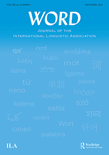
WORD-JOURNAL OF THE INTERNATIONAL LINGUISTIC ASSOCIATION
Uncovering insights that shape the future of linguistics.WORD-JOURNAL OF THE INTERNATIONAL LINGUISTIC ASSOCIATION is a leading peer-reviewed journal dedicated to advancing the field of linguistics and language studies. Published by Routledge Journals, Taylor & Francis Ltd, this esteemed journal has earned a reputation for its rigorous scholarship, reflected in its 2023 Q2 ranking in Linguistics and Language and its solid performance in Scopus Ranks. Encompassing a wide range of topics—from theoretical frameworks to empirical research—WORD serves as an essential resource for linguistics researchers, educators, and students alike. While currently not operating under an open access model, the journal is committed to providing high-quality, impactful research articles that contribute significantly to the linguistic community. With its convergence periods from 1998 to 2009 and 2015 to 2024, WORD continuously fosters the discourse of language studies, ensuring that critical insights and discussions are accessible for ongoing academic exploration.
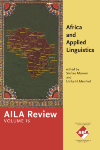
AILA Review
Connecting researchers through impactful linguistic discourse.AILA Review, published by John Benjamins Publishing Co, stands as a pivotal resource within the field of linguistics and language studies. With an ISSN of 1461-0213 and an E-ISSN of 1570-5595, this journal is dedicated to fostering innovative research and scholarship that advances the understanding of language in its diverse forms and applications. Spanning significant years from 2003 to 2016 and 2018 to 2024, AILA Review has established itself with a commendable reputation, reflected by its Q2 ranking in Linguistics and Language and notable Scopus rankings, positioning it in the 73rd percentile among Arts and Humanities. As an essential forum for researchers, professionals, and students alike, the journal invites high-quality contributions that engage with theoretical and practical aspects of language acquisition, multilingualism, and applied linguistics, enhancing discourse in these vital areas of study. Although not an open-access journal, its commitment to quality ensures that publications are widely recognized and cited, fostering impactful scholarly exchanges.

DEUTSCHE SPRACHE
Exploring the Depths of German LinguisticsDEUTSCHE SPRACHE, published by Erich Schmidt Verlag, is a pivotal journal dedicated to the intricate study of the German language. With its ISSN 0340-9341 and E-ISSN 1866-5233, this publication serves as a vital resource for linguists, educators, and language enthusiasts alike. Spanning diverse topics within the fields of linguistics and language, psychology, and social sciences, the journal has earned a Q3 ranking in Linguistics and Language, alongside a Q4 ranking in both Psychology (miscellaneous) and Social Sciences (miscellaneous) as of 2023. Although the journal is not Open Access, it provides invaluable insights on the developments in German language research from its convergence years of 2002 to 2011 and 2017 to 2023. Positioned in Berlin-Tiergarten, Germany, DEUTSCHE SPRACHE continues to expand its influence and accessibility to researchers, professionals, and students keen on understanding the nuances of linguistic expression in the German language.

Onomazein
Advancing Language Studies with Global ReachOnomazein is an esteemed academic journal published by the Pontificia Universidad Catolica de Chile, Facultad de Letras, featuring a dedicated focus on the field of Linguistics and Language. With an established presence since 2011, it reaches an international audience and is recognized for its contributions within the Q2 category of Linguistics as per the latest rankings, underscoring its significance in the academic community. The journal holds a commendable position in Scopus, ranking 470th out of 1088 in Arts and Humanities and 549th out of 1167 in Social Sciences, reflecting its relevance and impact in the domain. Although it does not currently offer an open access option, Onomazein remains a critical platform for researchers, professionals, and students seeking to advance their understanding of linguistic phenomena and engage with contemporary debates in language studies. For submissions and more information, please refer to the university’s address at AV Vicuna Mackenna 4860, Santiago, Chile.
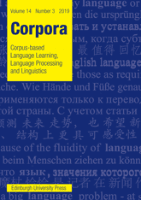
Corpora
Fostering Scholarly Dialogue in Corpora StudiesCorpora is a leading journal in the field of Linguistics and Language, published by Edinburgh University Press. Since its inception in 2006, Corpora has established itself as a pivotal platform for scholarly discourse, focusing on the analysis and interpretation of linguistic corpora across various contexts. The journal is recognized for its rigorous peer-review process and boasts a commendable impact within its category, achieving a Q2 ranking in the 2023 Linguistics and Language quartiles. Moreover, it ranks in the 79th percentile in Arts and Humanities Language and Linguistics and in the 77th percentile in Social Sciences Linguistics and Language, underlining its significance in the academic community. While currently not an open-access journal, Corpora is accessible to a broad audience, encouraging contributions from researchers, professionals, and students eager to advance the field of linguistics through innovative research and insightful discourse. For those invested in linguistic studies and corpora analysis, Corpora offers a vital resource and forum for the dissemination of high-quality research.